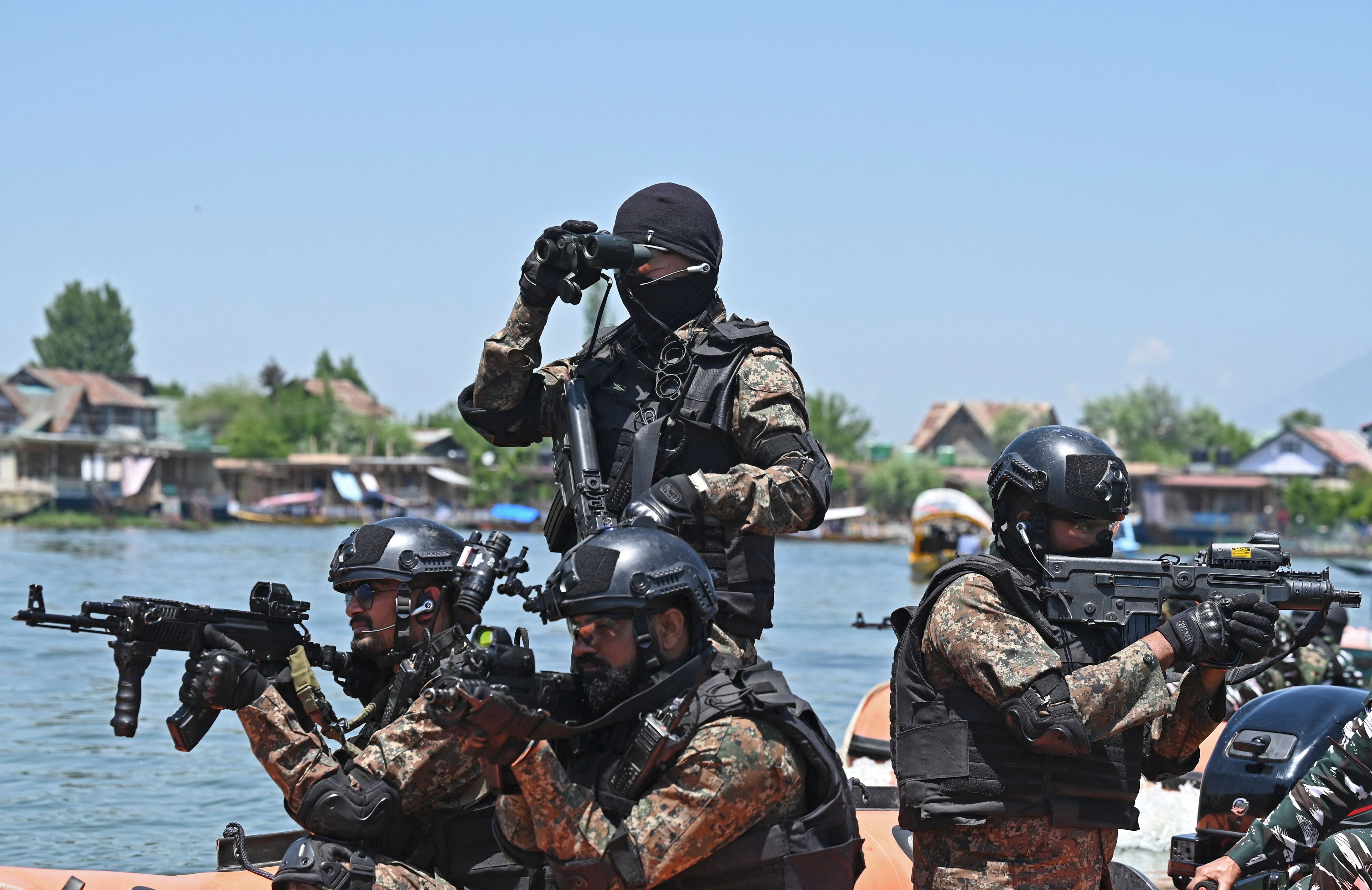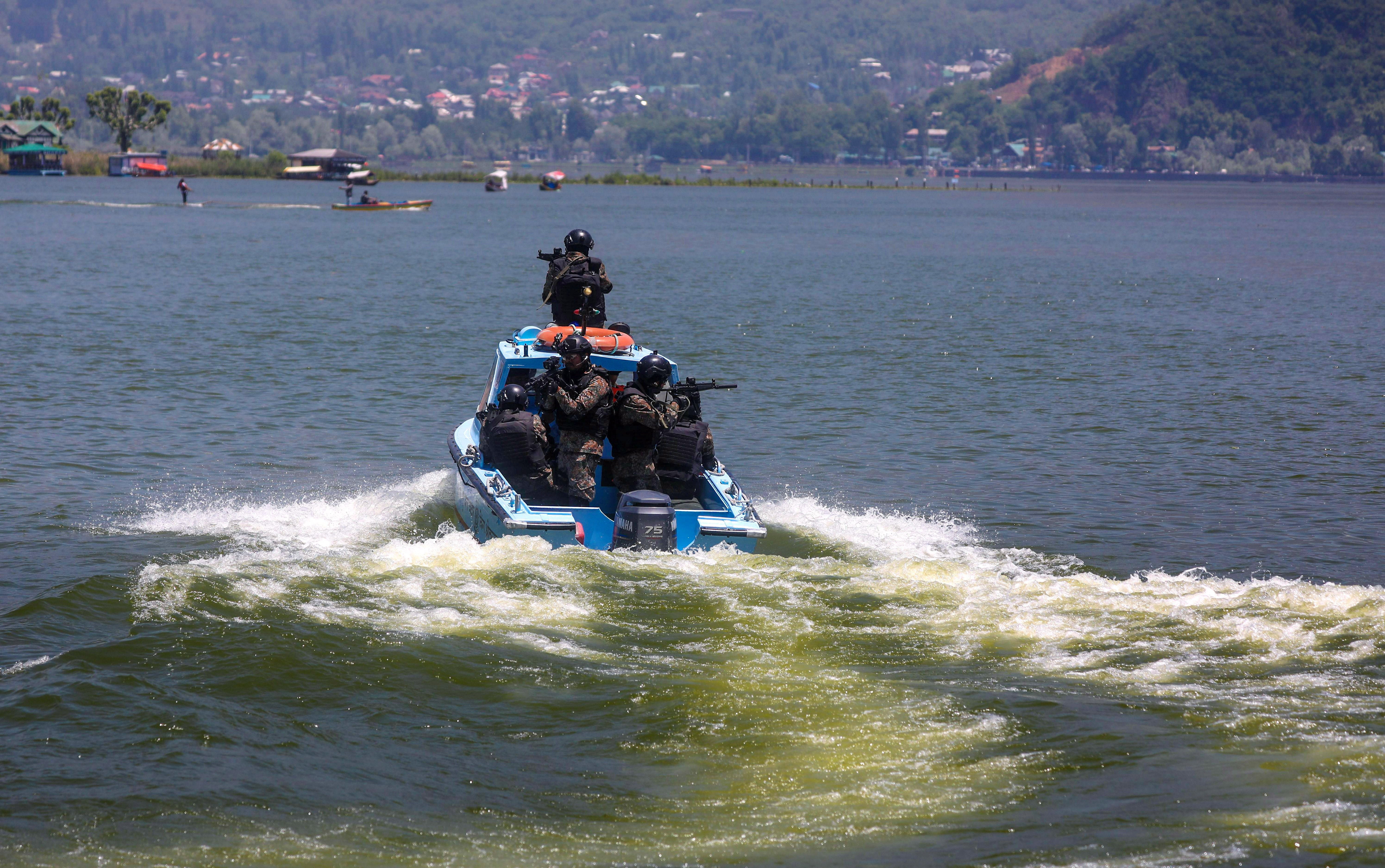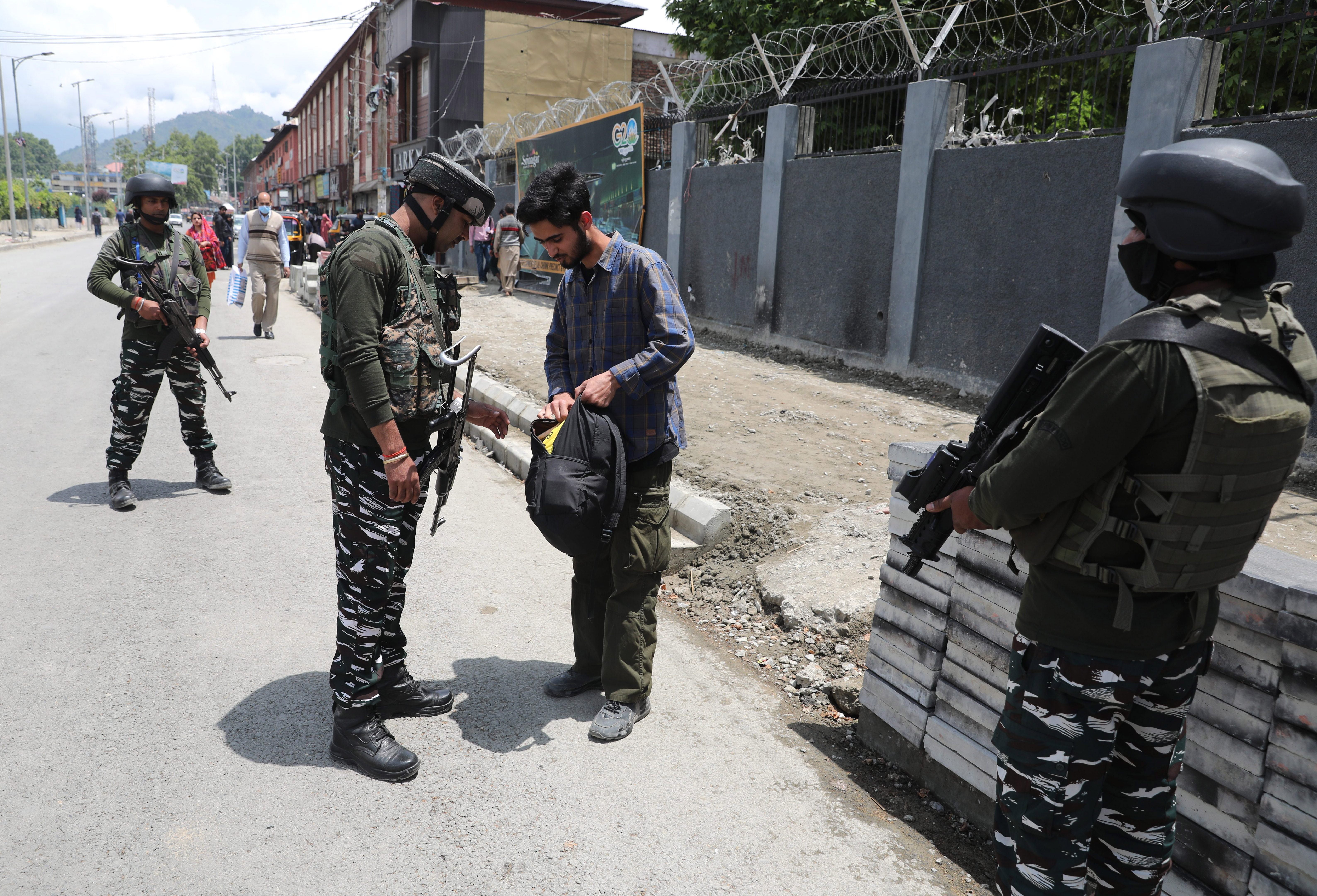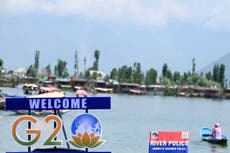Midnight raids, arrests and security checks as India projects ‘normalcy’ with Kashmir G20 summit
Srinagar is spruced up like never before for this week’s G20 tourism meeting. But a resident tells Shweta Sharma people do not feel safe in their own homes amid an ‘unprecedented surge’ of security activity


India has begun hosting a controversial G20 tourism meeting being held in the picturesque Kashmir valley, where the hosts stand accused of an “unprecedented surge” of raids and arrests in the name of securing the international event.
Kashmir, which is administrated in parts and subject to broader territorial claims by India, Pakistan and China, is one of the most heavily militarised regions in the world, and several G20 member states including China, Saudi Arabia and Turkey are staying away from the tourism summit.
In the middle of the night on a day leading up to the G20 meet, which runs this week until Wednesday, a family in Kashmir’s largest city Srinagar was woken up to loud bangs on their door by about 20 to 30 military personnel.
India’s security forces raided their home and locked them inside, beginning what the family said was the longest hour of their lives.
Several gun-toting security personnel barged into their home just as the family had gone to bed, and asked to accompany a male member to a top floor room where they set up a light machine gun on a table, Asad Rehman*, one of the family members, told The Independent.
“One security personnel used me as a shield and I could hear his gun clicking behind me before he asked me to take them to the top floor room,” Rehman said.
After entering the room, the military personnel nodded at each other as one of them said, “We’re in the right house.”
“It was that moment when I thought this is it, the house might blow up any moment or I will be shot, and began saying final prayers in my head.”
The man said security forces kept his elderly parents inside one room and did not allow them to leave, asking them to turn the lights off throughout the raid.
“The security forces verbally abused and harassed [us] for nothing. They just came and began checking without offering any explanation. It was the most traumatic night of our lives as we were clueless about what was happening and why,” he said.
The forces entered the house by scaling walls and not through the main entry gate, according to him. “They came without asking permission and left without giving an explanation,” Rehman said.
He said four or five homes in the same neighbourhood were raided in the same night and perhaps dozens more in the following nights. “The conflict always touched us on the surface. But now after this raid we feel violated and traumatised,” said Rehman.
The alleged raids came just days before the G20 meeting started on Monday with the goal of boosting tourism and projecting a display of normalcy in the disputed region.
The government has made elaborate arrangements in the run-up to the three-day event. It revamped the city’s commercial centres and spruced up roads and highways leading up to the convention centre on the iconic Dal Lake.

Walls and roads were splashed in orange, while the city’s streetlights were lit up in the tricolour of the Indian national flag.
This week’s meeting is the first major international event in the valley since New Delhi stripped Muslim-majority Jammu and Kashmir state of its semi-autonomy in 2019, scrapping a clause of the constitution that granted it special status and splitting it up into two federally administrated territories.
Security has been beefed up even further in the weeks leading to the summit, with elite security forces like the marine commandos, National Security Guard, the Border Security Force and various police forces deployed on the ground.
In another alleged raid, the daughter of separatist leader Shabir Shah tweeted CCTV footage of security personnel entering her home and conducting search operations. Sehar Shabbir said their house was raided because of the G20 meet, and called it the “highest level of harassment”.
“This video shows army men, black cat commandos leaving my home and the damage they caused following this massive devastating raid,” she said.
“My mother accompanying half of them while they searched the top level of the house and rest were checking the ground floor and other rooms. They destroyed the drawing room’s furnishings and scattered objects all over,” she said.
Srinagar police said they were aware of “tweets by daughter of separatist Shabir Shah claiming harassment during search operation”. A statement said: “It is clarified that it was search[es] of 20 houses, when inputs of movement of terrorists in this locality came. This has nothing to do with G20 but is routine in case of inputs.”
Mehbooba Mufti, former chief minister of Jammu and Kashmir when it was a state, claimed police locked up and detained hundreds of Kashmiris ahead of the meeting.
In a party newsletter, she alleged there was an “unprecedented surge in arrests, raids, surveillance and persecution of our people”.
“Security forces are breaking into homes, ransacking & violating the privacy of people here,” she tweeted.
“As if the existing repression in Kashmir wasn’t enough, GOIs [Government of India’s] paranoia about G20 has unleashed bigger demons. Even women are not being spared.”
In a statement on Monday, police said there had been a “need to enhance the security measures at vulnerable locations to avoid any chance of terrorist attack” during the meeting.
The valley has a bloody history including some of the deadliest militant attacks on Indian security forces since a violent insurgency began in 1989. India has accused Pakistan of fuelling the insurgency, a claim Islamabad has denied.
India has responded to these incidents with a brutal counter-insurgency that has left thousands of militants dead, as well as perpetrating what human rights activists allege is a litany of rights violations for civilians.
At the end of a review meeting in 2022, home minister Amit Shah claimed 229 terrorist attacks occurred in 2021, a decrease from 417 in 2018. He said killings of members of the security forces reduced from 91 in 2018 to 42 in 2021.
India, the G20 president for 2023, has hoped to showcase that the controversial changes in 2019 brought “peace and prosperity” to the region amid opposition from neighbours Pakistan and China.
China marked its objection by publicly rejecting the G20 invite, citing firm opposition “to holding any kind of G20 meetings in the disputed territory”. Other countries have quietly stayed away, including previous G20 hosts Indonesia.
India’s tourism secretary Arvind Singh told reporters on Saturday that the meeting “was not only to showcase its (Kashmir’s) potential for tourism but to also signal globally the restoration of stability and normalcy in the region”.
Domestic tourists certainly have returned to the valley with a vengeance since the end of pandemic-era restrictions on travel, with an Associated Press report describing hotels across Srinagar and surrounding beauty spots being booked up for months.
But if this is “normalcy”, then it has been taking place for the past few weeks under the watchful eye of almost ubiquitous armed security forces, with increased checks on people coming out of their houses for work and other day-to-day activities, while the main road to the convention centre was shut for civilian traffic along with many city schools.
Roads bore a deserted look as barricades were placed on the streets, while people tried to avoid security checks.

At the start of the summit itself, most of the checkpoints – locally known as bunkers – that appear once every 200m on regular days were either removed or camouflaged with cubicle-like security posts decorated by G20 signage.
Paul Staniland, a political scientist who studies south Asia at the University of Chicago, told the Associated Press that the G20 meet was “in line with Indian government policy to symbolically project normalcy and stability in Kashmir” and was unlikely to herald any policy changes.
Mufeed Hilal, a resident of Kashmir, said that even as the meeting could boost tourism, the people “want to see the Kashmir issue resolved”.
Fernand de Varennes, the UN’s special rapporteur on minority issues, had last week called out the meet as a “facade of normalcy” while “massive human rights violations” continued in the region.
“The government of India is seeking to normalise what some have described as a military occupation by instrumentalising a G20 meeting and portray an international ‘seal of approval’,” he said.
The comments were dismissed by India’s mission at the UN in Geneva, which said the statement was “baseless”, with “unwarranted allegations”.
“We are aghast that Fernand de Varennes has acted irresponsibly to politicise this issue, misused his position as SR [special rapporteur] to publicise on social media his presumptive and prejudiced conclusions,” the statement said.
*Name changed to protect identity
Join our commenting forum
Join thought-provoking conversations, follow other Independent readers and see their replies
Comments


Bookmark popover
Removed from bookmarks